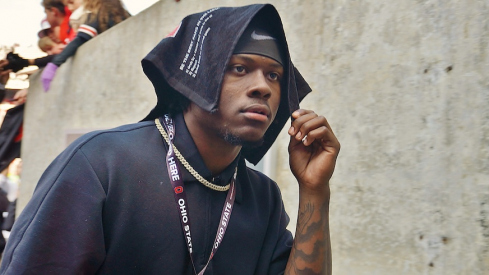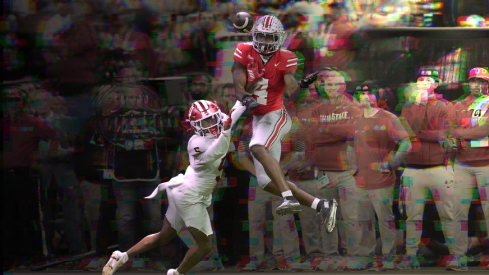In an unending and exhausting grind to be among college football’s elite, consider summer recruiting the latest front in the the sport’s swelling arms race.
And if June and July were ever considered a de facto armistice, such a time feels ancient. Welcome to a world with truly no offseason.
While months still loom before a single ball is blasted off a single tee to kick off another season and mark yet another conception of championship-filled hopes and dreams, the campaign toward football glory starts now.
In a thorough and powerful exposé on the wild west nature of summer recruiting and how schools might've found a loophole around intricate and meticulous NCAA rules governing proper practices, Jeremy Fowler of CBSSports.com explored how some schools are putting high school coaches — who happen to sometimes have relationships with target prospective student-athletes — on their payroll for summer camps.
According to Fowler’s Wednesday report, Ohio State, Florida State and Washington combined for more than $150,000 in guest camp fees last summer, raising questions over the legality and morality of such a commonplace practice.
In the case of Ohio State, which paid $50,359.09 to 147 guest coaches/counselors working its 2013 camps, the vast majority of that money went to in-state high school coaches, smaller, lower-level college coaches and members of the Buckeyes’ own support staff.
Related
It’s an easy, practical and permissible way to make a couple hundred dollars while gaining coaching/scouting experience.
What concerns some coaches and experts in the field, however, is how the system in place and its somewhat unregulated nature might be ripe for abuse.
Arizona and former Michigan coach Rich Rodriguez called it a “shuttle service.”
“Essentially what (schools) are doing is paying to bring prospects to their camps,” Rodriguez told Fowler and CBSSports.com.
And according to NCAA bylaw 13.12.2.2 (b), which forbids schools from paying guest coaches “on the basis of the value he or she may have for the employer because of his or her reputation or contact with prospective student-athletes,” that has the potential to be a problem.
But bringing in high school coaches — and those with ties to highly-touted and sought-after recruits — seems to be a relatively routine, albeit dubious, affair.
In addition to the Buckeyes, Seminoles and Huskies, Fowler looked into Oregon, Wisconsin, LSU, Clemson, Georgia, Virginia Tech and Oklahoma.
According to Fowler's report, Florida State shelled out $70,808.64 for 141 coaches, Washington paid $32,588.60 for 29 coaches, Wisconsin paid $10,809.38 for 39 coaches and Oregon paid $3,000 for 20 coaches. Virginia Tech and Georgia did not enlist guest coaches. LSU, Clemson and Oklahoma run their camps through private entities and thus did not provide public records of guest fees to CBSSports.com.
And the NCAA doesn’t regulate the number of unofficial visits a prospective student-athlete can take. Meaning, in theory, recruits can take as many trips as they wants to Columbus, Tallahassee or Eugene before having to follow a more stringent code when it comes to the flurry of official visits in the fall.
For schools vying for the same talent and competing for the same thing, it might be a matter of strategic posturing. The more you can get a recruit on your campus, the more you can sell him on your product before other suitors try to do the same. The concept itself is pretty simple, pretty smart.
Cultivating an army of high school coaches to provide support for massive summer camps is a standard and acceptable procedure too.
According to NCAA bylaw 13.12.2.2:
A member institution (or employees of its athletics department) may employ a high school, preparatory school or two-year-college coach or any other individual responsible for teaching or directing an activity in which a prospective student-athlete is involved at its camp or clinic.
And schools are within their rights to pay their guest coaches, according to NCAA bylaw 13.12.2.2 (a):
The individual receives compensation that is commensurate with the going rate for camp counselors of like teaching ability and camp experience.
The gray area, of course, hovers around the notion of paying for influence and whether schools are using money to indirectly influence where a prospective recruit ultimately signs.
Through an open records request, Eleven Warriors obtained the list of guest coaches Ohio State paid for their services last summer. Here’s a breakdown of what notable high school coaches — and their respective compensation — are listed on the four-page document:
- Paul Meunier ($1,409): Meunier, an assistant coach at Dwyer High School in Palm Beach, Fla., coached highly-touted freshman wide receiver Johnnie Dixon.
- Tyrone Giscombe ($671.60): Giscombe, a coach at Cocoa High School in Cocoa, Fla., coaches 2015 commit Jamel Dean. According to the list, Giscombe was paid one installment $350 and three other installments of $321.60 in addition to having $321.60 deducted.
- Roderick Chapman: ($1,210): Chapman is listed as the junior varsity coach for Bishop McNamara High School in Forestville, Md., (just outside Washington, D.C.) where one-time Buckeyes target and Rivals.com five-star tackle Damian Prince went to prep school before electing to attend Maryland in February.
- Aazaar Abdul-Rahim ($752): Abdul-Rahim, who stepped down from his post at Friendship Collegiate Academy in Washington, D.C., to serve as a defensive analyst for Alabama in February, coached Rivals.com five-star cornerback, one-time Ohio State target and and Florida commit Jalen Tabor.
And while more than $4,000 is a small chunk out of a payroll of 147 guest coaches and counselors, it may raising flags amidst a turbulent college football landscape.
“There will be times where it makes you raise your eyebrows, the traveling of long distances,” NCAA managing director of enforcement Mark Hicks told Fowler.
“Are we concerned? Absolutely. Does it mean every time a high school coach works a football camp that something must be wrong? No.”
Because interest in Ohio State from Dixon, Dean, Prince and Tabor was there regardless. What remains more muddled, though, is whether the Buckeyes — and other schools employing the same practice — gain some sort of competitive edge in college football's rat race.


